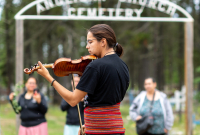Support strong Canadian climate journalism for 2025
Métis fiddler Tristen Durocher has passed the halfway mark on his walk from La Ronge to Regina to press for a legislated suicide prevention strategy. He intends to fast in front of the legislature building until something is done about it.
The walk is in protest of the province's failure to adopt an Opposition bill to address suicide prevention by Cumberland NDP MLA Doyle Vermette this spring.

Durocher called the province “criminally negligent” for not working on a legislative solution to a problem that “should be bipartisan.”
“It’s a violation of their fiduciary responsibility to the residents of this province to provide mental health services,” Durocher said.
“The tragic loss of a person by suicide is felt not only by family and friends, but by the entire community. We want to assure the public that suicide prevention is a priority for the government of Saskatchewan,” government spokesperson Matthew Glover told Canada’s National Observer.
Durocher is putting together a collection of 200 photos from families who have lost loved ones to suicide that he plans to exhibit at a park in front of the legislature.

“There was one family that sent me a photo of a boy, and then four days later wrote me to say, ‘We didn’t think that we’d be sending you another photo (of another death) so soon, but this is our niece, and we lost her yesterday.’ That to me made this epidemic real, beyond statistics on deaths,” Durocher said.
“This is covert genocide.”
Rural and Remote Health minister Warren Kaeding said the government's action plan released in May would address those issues.
“This plan will guide activities specific to suicide prevention based on Saskatchewan’s context. It was informed by careful consideration of approaches across the country and international best practice,” Kaeding said.
But Durocher and others remain unconvinced. “It’s not a legislated document and there’s no accountability for following through on any of those vague suggestions... It does not inspire a lot of confidence and neither does Warren Kaeding," Durocher said.
Jack Hicks, an adjunct professor of community health and epidemiology at the College of Medicine at the University of Saskatchewan, was highly critical of the province's move to reject the bill.
“The government of the province with the highest rate of suicide in the country becomes the first province in Canadian history to vote down a totally polite, sane motion calling for serious action on suicide prevention. That’s something,” Hicks told Canada’s National Observer in an interview Monday.
Saskatchewan had the highest suicide rate among the provinces as of 2018, which Hicks said is the most recent nationally comparable data.

“If it was a class assignment, I would give it a 'D',” Hicks said of Saskatchewan’s suicide prevention plan.
“Released on May 8, Pillars for Life: The Saskatchewan Suicide Prevention Plan is our plan to address suicide prevention. Pillars for Life was created to guide suicide prevention initiatives and activities specific to the cultural and social landscape of Saskatchewan,” Glover said.
Glover said the five pillars of the plan align with those set out by the Mental Health Commission of Canada and include specialized supports.
Glover said the plan calls for specific engagement with First Nations and Métis leadership as the work progresses.
“Ensuring a community-driven approach honours the fact that each community is unique and the solutions they present will produce meaningful change,” he said.

Hicks worked with the Federation of Sovereign Indigenous Nations (FSIN) to produce the first provincial suicide prevention plan for Indigenous people in Canada. He also worked on the Inuit suicide prevention strategy and the Nunavut strategy.
“The situation in northern Saskatchewan is not complicated and what needs to be done about it is not complicated,” Hicks said, adding the path to a solution has already been laid out for the provincial government in FSIN’s strategy.
“I think Tristen Durocher is absolutely right in his characterization of the provincial strategy.
“I almost hate to use the word strategy because it barely lives up to the term.”

Hicks said the federal government’s approach hasn’t been much more successful than Saskatchewan’s and gave it a C-minus, noting Canada and the Netherlands are “the two only developed countries in the world with no national suicide prevention strategy.”
He said suicide by Indigenous people is ghettoized in Canada on both provincial and federal levels.
“They should reflect on the pain that has driven (Durocher) to do this, they should pick up the FSIN strategy and read it. They should call FSIN and the Métis Nation and sit down and rethink this in a spirit of full partnership, recognizing this is a largely preventable public health issue,” Hicks said.
Glover said that the province has met with representatives of the FSIN and Métis Nation–Saskatchewan to discuss Pillars for Life.
“We are appreciative of the work that went into the development of the Saskatchewan First Nations Suicide Prevention Strategy and look forward to working with Health Canada and First Nation communities to find solutions to address suicide in communities across the province,” Glover said.
Hicks also noted that while death by suicide disproportionately impacts northern and Indigenous communities, it was a spike in non-Indigenous suicide that pushed Saskatchewan’s rates above those of Manitoba in 2018.
Saskatchewan NDP Leader Ryan Meili joined Durocher on his walk in Prince Albert and Saskatoon and said he’s ready to work with the Saskatchewan Party government to pass legislation. He said the government could pass legislation “any time,” but doesn’t because it does not care about northerners.

“There’s no question it’s politically motivated. They wanted this to go away. They introduced a plan that is not a plan. It’s not a recognized suicide prevention strategy... It will not save lives,” Meili said.
Premier Scott Moe addressed the issue in the legislature in June and called Pillars of Life “the very first steps... on a journey that we need to travel… together as individuals in communities right across this province.”
Hicks said that in jurisdictions where suicide prevention plans have worked, such as the province of Quebec, it’s because it has been a bipartisan issue. But he said that’s not the case in Saskatchewan.
Meili said he worries the rejection of the bill was “more of a cynical move” because the government feels helping northerners and First Nations people is unpopular with its supporters.
“This is not a frivolous ask. This is an ask to save lives, and it’s worth them listening to.”
Hicks said he doesn't think the province is deliberately hurting northerners.
“I think they’re averse to spending money on Indigenous social realities that differ from the mainstream approaches… ”

Glover said that in 2020-21, the government is investing a record $435 million in mental health and addictions services and supports across Saskatchewan.
Durocher is also calling for Kaeding’s resignation. Glover said Kaeding has offered to meet with him. Durocher confirmed this, but said he declined to meet privately.
“That’s not how... northern Indigenous people do things. We work together. We are together trying to keep our communities on literal life support,” Durocher said.
“When we’re speaking to one of the premier authorities on rural and remote health, it shouldn’t just be me speaking on behalf of everybody.”
Durocher said he’s focused on getting to Regina, and he hopes the premier will meet with him once he is there.

“I would speak to Scott Moe because when I give some statistics to him, and when I articulate some realities that I’ve lived through... the funerals I’ve been to since I was a child, I want to see if he has a look of shame. I’d really like to know where his heart is.”
Glover reiterated the government’s willingness to talk.
“Our government is always open to conversations about how we can make improvements to the challenges of mental health and suicide,” Glover said.
Michael Bramadat-Willcock/Local Journalism Initiative/Canada's National Observer
If you are or someone you know is experiencing suicidal thoughts, help is available at all hours. Support can be found at the Canada Suicide Prevention Service website. If you are in immediate danger, you can call 911.
You can learn more about suicide prevention in the province at Saskatchewan.ca.









Comments